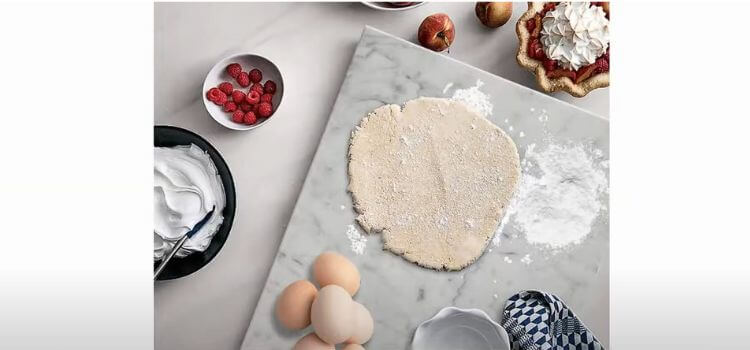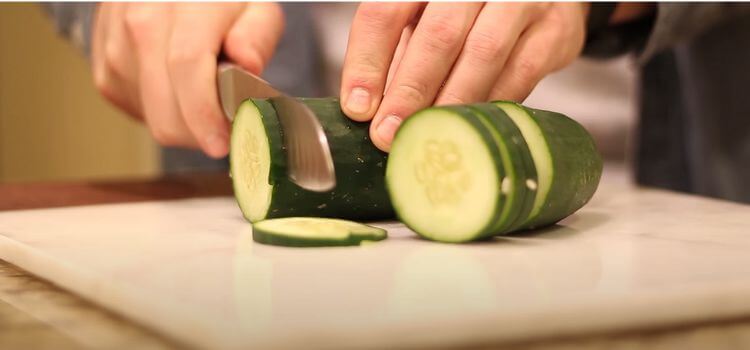When we talk about cutting boards, we usually think of wood or plastic. However, there’s another kind of cutting board that’s gaining popularity – marble cutting boards. Marble is a natural stone that looks beautiful and luxurious, often seen in kitchens that want to look fancy. But the question is: Are marble cutting boards good?
In this post, we will discuss the pros and cons of using a marble cutting board, as well as provide tips for care and maintenance.
By the end of this article, you’ll have a better understanding of whether a marble cutting board is a good fit for your kitchen.
What are Marble Cutting Boards?
Marble is a type of rock that forms over millions of years through pressure and heat. It is commonly used for countertops, floors, and, yes, even cutting boards. A marble cutting board is smooth, hard, and shiny, available in various colors like white, black, or grey, often featuring beautiful patterns. Marble is popular because of its elegant appearance and its cool-to-the-touch feel. It’s also naturally heavy, which helps keep it stable on the countertop during use.
However, just because something looks attractive doesn’t mean it’s the best choice for every task. Marble has both advantages and disadvantages when used as a cutting board.
Marble cutting board pros and cons
Pros of Marble Cutting Boards
Durability: Marble cutting boards are incredibly durable and can withstand heavy use without showing signs of wear and tear.
Hygienic: Marble is naturally non-porous, making it resistant to bacteria and odors, which makes it a great choice for food preparation.
Aesthetic appeal: Marble cutting boards have a beautiful and elegant appearance that can add a touch of sophistication to your kitchen decor.
Heat resistance: Marble is a natural insulator and can withstand high temperatures, making it a great surface for hot pots and pans.
Cons of Marble Cutting Boards
Heavy: Marble cutting boards are heavy and can be difficult to move and clean.
Can dull knives: Marble is a very hard material, which can dull the edges of your knives more quickly than softer materials like wood or plastic.
Expensive: Marble cutting boards tend to be more expensive than other types of cutting boards, which can be a deterrent for some people.
Requires maintenance: Marble cutting boards need to be sealed regularly to prevent staining and etching, which can be time-consuming and require additional maintenance.
Related topic: If you want to learn more about marble cutting boards, you can check out this topic: Best Non-Toxic Cutting Boards.
Tips For Using And Caring For Marble Cutting Boards
Marble cutting boards are ideal for pastry work due to their nonstick surface and cool touch. However, they’re not suitable for chopping as they can damage knives and lead to accidents easily.
Care for marble boards by avoiding knife use and applying a protective sealer for longevity.
Recommended Uses And Food Preparation

If you’re considering using a marble cutting board, it’s important to know the recommended uses and how to prepare food on this luxurious material. Marble cutting boards are perfect for working with doughs for pies, biscuits, homemade pastas, and other baked goods.
The smooth surface of marble is naturally nonstick, allowing for easy rolling and shaping of dough. Additionally, marble stays cool to the touch, which is ideal for keeping butter or other ingredients chilled during the preparation process.
- Use marble cutting boards for working with doughs and baked goods
- Marble stays cool to the touch, keeping ingredients chilled
However, it is important to note that chopping anything, especially vegetables, on a marble cutting board is not recommended.
Additionally, marble cutting boards can be slippery, increasing the risk of dangerous slips and accidents in the kitchen.
Cleaning And Maintenance Guidelines
Caring for your marble cutting board is essential to ensure its longevity and maintain its beauty. Here are some tips on how to clean and maintain your marble cutting board:
- After each use, rinse the cutting board with warm water to remove any food residue.
- Use a mild dish soap and a soft sponge or cloth to gently clean the surface of the cutting board.
- Avoid using abrasive cleaning products or scrub brushes, as they can scratch the marble surface.
- For stubborn stains, create a paste of baking soda and water, apply it to the stain, and let it sit for a few minutes before gently scrubbing it away.
- After cleaning, make sure to thoroughly dry the cutting board to prevent moisture buildup.
- Apply a marble sealer to create an additional layer of protection. Adhere to the guidelines provided by the manufacturer for the particular sealer you select, ensuring it is fully dried before utilizing the cutting board.
- Store your marble cutting board in a dry and well-ventilated area to prevent the growth of mold or mildew.
Are Marble Cutting Boards Good for Knives?

Now, let’s dive deeper into the biggest question: Are marble cutting boards good for knives? The simple answer is no. Here’s why:
Marble is a very hard material, which is great for making floors or countertops but not so good for cutting things. When you cut on marble, the sharp edge of your knife hits the hard stone over and over again. Over time, this can dull the blade, meaning it won’t be as sharp, and you’ll have to sharpen it more frequently.
Knives made of softer materials like stainless steel will dull faster on a marble board. This is why professional chefs prefer using wooden or plastic cutting boards, which are softer and less harsh on knives.
If you love your knives and want to keep them sharp for as long as possible, it’s better to use a wooden or plastic cutting board for everyday chopping and slicing. Marble can still be useful for other tasks, though.
Marble vs. Other Cutting Board Materials
Marble cutting boards are just one option. There are other materials used for cutting boards, and each has its own strengths and weaknesses. Let’s compare marble to some of the other common materials:
Marble vs. Wood
Wooden cutting boards are softer than marble, which means they’re gentler on knives. Wood also has a natural beauty and can last a long time with proper care. However, wood is porous, which means it can absorb liquids and bacteria if not cleaned properly. Unlike marble, wooden boards need to be oiled regularly to maintain their surface.
Marble vs. Plastic
Plastic cutting boards are lightweight and cheaper than marble. They’re also dishwasher-safe, making them easier to clean. However, plastic boards can get scratched easily, which creates spaces for bacteria to grow. Plastic doesn’t look as nice as marble, but it’s practical for everyday use.
Marble vs. Bamboo
Bamboo cutting boards are eco-friendly and affordable. Bamboo is harder than wood but not as hard as marble, which means it’s a bit more knife-friendly than marble but still somewhat harsh. Like wood, bamboo needs regular oiling to stay in good condition.
When is a Marble Cutting Board the Best Choice?
Marble cutting boards are not always the best for everyday chopping, but there are certain tasks they’re perfect for. For example:
- Cheese boards: Marble boards look beautiful when serving cheese, crackers, and other snacks. The smooth surface makes food easy to present.
- Pastry preparation: If you like baking, marble cutting boards are great for rolling dough because the cool surface helps keep the dough from sticking or melting.
- Serving platters: Marble cutting boards can double as serving trays for fruits, desserts, or charcuterie.
Are Marble Cutting Boards Safe for Food Preparation?
One big question about cutting boards is whether they are safe for food preparation. Marble cutting boards are non-porous, which means they don’t absorb liquids like wood can. This makes them more resistant to bacteria and easier to keep clean.
However, if your marble cutting board gets chipped or cracked, it can become unsafe because small pieces of marble could get into your food. Always check your board for any damage before using it.
Frequently Asked Questions
Is It Safe To Use Marble As A Cutting Board?
Yes, it’s safe to use marble for working with dough and baked goods. However, avoid chopping on it to prevent knife damage and slips. Marble boards are not recommended for cutting. Additionally, consider applying a marble sealer for extra protection.
Do Knives Scratch Marble?
Yes, knives can scratch marble surfaces. It is not recommended to use knives directly on marble as it can damage both the knives and the marble surface easily. Using a cutting board made of wood or plastic is advisable to protect the marble.
What Is The Healthiest Cutting Board Material?
Wood (hardwood, not softwood) or glass/stone are usually the healthiest materials for cutting boards. These materials are nonporous or have antimicrobial properties that resist bacterial growth. Avoid using marble as it can damage knives and cause slips.
Do I Need To Seal A Marble Cutting Board?
Yes, it’s recommended to seal a marble cutting board for an extra layer of protection. A marble sealer creates a barrier that helps prevent stains, scratches, and other damage.
Follow the manufacturer’s instructions for the specific sealer you choose and allow it to dry completely before using the cutting board.
Conclusion
So, are marble cutting boards good? The answer depends on what you need in your kitchen. If you’re looking for something beautiful and durable for light tasks like serving or rolling dough, marble cutting boards are a great choice. They look fantastic and can last a long time with proper care.
However, if you’re looking for a cutting board to use every day for chopping vegetables or meat, you might want to consider wood or plastic instead. Marble is tough on knives and can be heavy to handle.
Ultimately, it’s up to you to decide which cutting board works best for your kitchen and cooking habits.
Leave a Reply